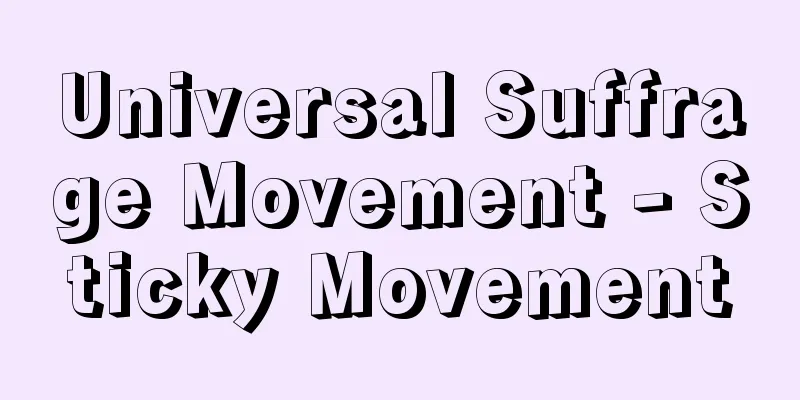Universal Suffrage Movement - Sticky Movement

|
A movement demanding universal suffrage. Movements to break down restricted suffrage were carried out in various countries along with the rise in political consciousness of the working class, beginning with the Chartist movement in the UK. In Japan, it began with the Universal Suffrage Promotion Association. In 1900, the Universal Suffrage Association submitted a petition for universal suffrage to the House of Representatives, and in 1902, the first bill for universal suffrage was submitted to the House of Representatives. In 1911, the Universal Suffrage Act passed the House of Representatives, but was rejected by the House of Peers. After the rice riots, under the influence of the democratic ideology of Yoshino Sakuzo and others, the Universal Suffrage Association resumed its activities in 1918, and a broad public movement centered on organized labor rose to prominence, with 75,000 people demonstrating in Tokyo in 1920. During this time, the electorate was expanded to those who received 10 yen or more in direct national tax in 1900, and to those who received 3 yen or more in 1919. However, the Hara Takashi Cabinet, which rejected universal suffrage, dissolved the Diet in opposition to this, and labor unions and socialists retreated from the movement due to the influence of anarcho-syndicalism. Later, the established political parties did not join the mass movement, but launched the second constitutional protection movement, and in 1925, the three-party constitutional protection cabinet led by Kato Takaaki enacted the Universal Suffrage Law along with the Peace Preservation Law. Property-based restrictions on the right to vote for men over the age of 25 were abolished, but women's suffrage was not realized until after World War II. → Universal Suffrage Law → Related topics Ooi Kentaro | Ozaki Yukio | Kinoshita Naoe | Japan Socialist Party | Universal Suffrage Source : Heibonsha Encyclopedia About MyPedia Information |
|
普通選挙権を要求する運動。制限選挙を打破する運動は英国のチャーチスト運動をはじめとして労働者階級の政治意識の向上とともに各国で行われた。日本では普通選挙期成同盟会に始まる。1900年普通選挙同盟会が普選請願書を衆議院へ提出,1902年初めて普選法案が衆議院に上程された。1911年普選法が衆議院を通過したが貴族院で否決された。米騒動後,吉野作造らの民本主義の影響を受けつつ1918年普選同盟会が活動を再開,組織労働者を中心とする広範な民衆の運動が高揚し,1920年東京で7万5000名のデモが行われた。この間,有権者は1900年直接国税10円以上の者に,1919年3円以上の者に拡大された。しかし普選拒否の原敬内閣は議会を解散してこれに対抗し,労働組合,社会主義者はアナルコ・サンディカリスムの影響で運動から後退した。のち既成政党は大衆運動と結合せず,護憲運動(第2次)を展開,1925年加藤高明の護憲三派内閣は治安維持法と一緒に普選法を制定した。25歳以上の男子に対して財産による選挙権の制限は撤廃されたが,婦人参政権は第2次大戦後まで実現しなかった。→普通選挙法 →関連項目大井憲太郎|尾崎行雄|木下尚江|日本社会党|普通選挙 出典 株式会社平凡社百科事典マイペディアについて 情報 |
<<: Battle of the River - Sticky notes
Recommend
ESCARGOT
The name of Toshiba's cyclone handheld cleaner...
Chair Shape - Isu-gata
… The six carbon atoms of cyclohexane are not on ...
Onoe Kikugoro
Kabuki actor. Stage name: Otowaya. The first of h...
Foreign Exchange and Foreign Trade Control Law
The Basic Law for Foreign Economic Transactions w...
Moina rectirostris (English spelling) Moina rectirostris
…[Shigeo Gamou]. … *Some of the terminology that ...
Climate table - Climate table
Climate tables display climate data for various re...
Struggle against business consolidation - Struggle against business consolidation
...However, the policy itself had problems with i...
Gaseous nebula
A nebula is a gaseous nebula that is composed main...
Sociology of music
A branch of musicology that studies the relationsh...
Ham Vaśśī Hain (English spelling)
...After studying English literature and law in L...
Ghost ship
A supernatural spirit that is said to appear on t...
Kanto Basin Creation Movement
...The plateau is extremely flat, but the elevati...
Black Bass - Large-mouth Bass
A freshwater fish belonging to the order Percifor...
Kokon Iroha Hyorin - Kokon Iroha Hyorin
A collection of performance critiques on each role...
Malayu
...It is believed to be near present-day Jambi. I...









